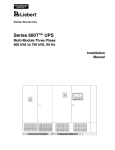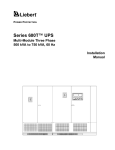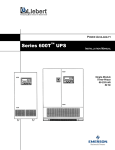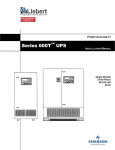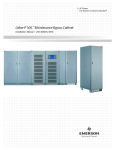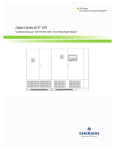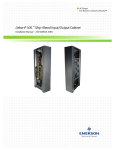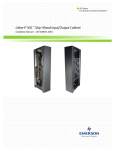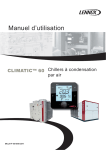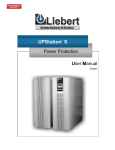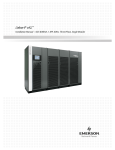Download Emerson Series 600T Installation manual
Transcript
DISCONTINUED PRODUCT POWER PROTECTION Series 600T™ UPS Single Module Three Phase 500 kVA to 750 kVA, 60 Hz Installation Manual DISCONTINUED PRODUCT Table of Contents 1.0 SAFETY PRECAUTIONS . . . . . . . . . . . . . . . . . . . . . . . . . . . . . . . . . . . . . . . . . . . . . . . . . . . . . . 3 2.0 INSTALLATION CONSIDERATIONS . . . . . . . . . . . . . . . . . . . . . . . . . . . . . . . . . . . . . . . . . . . . . . 4 3.0 UNLOADING AND HANDLING . . . . . . . . . . . . . . . . . . . . . . . . . . . . . . . . . . . . . . . . . . . . . . . . . 5 4.0 INSPECTIONS 4.1 External Inspections. . . . . . . . . . . . . . . . . . . . . . . . . . . . . . . . . . . . . . . . . . . . . . . . . . . . 6 4.2 Internal Inspections . . . . . . . . . . . . . . . . . . . . . . . . . . . . . . . . . . . . . . . . . . . . . . . . . . . . 6 5.0 EQUIPMENT LOCATION . . . . . . . . . . . . . . . . . . . . . . . . . . . . . . . . . . . . . . . . . . . . . . . . . . . . . 7 6.0 BATTERY INSTALLATION 6.1 Battery Safety Precautions . . . . . . . . . . . . . . . . . . . . . . . . . . . . . . . . . . . . . . . . . . . . . . 8 6.2 Battery Cabinets. . . . . . . . . . . . . . . . . . . . . . . . . . . . . . . . . . . . . . . . . . . . . . . . . . . . . . 11 6.3 Non-Standard Batteries . . . . . . . . . . . . . . . . . . . . . . . . . . . . . . . . . . . . . . . . . . . . . . . . 11 7.0 CONFIGURING YOUR GROUND AND NEUTRAL CONNECTIONS 7.1 Preferred Grounding Configuration, Wye-Connected Service . . . . . . . . . . . . . . . . . . 13 7.2 Alternative Grounding Configuration, Wye-Connected Service . . . . . . . . . . . . . . . . 14 7.3 Grounding Configuration, Delta Source or Impedance-Grounded Wye . . . . . . . . . . 15 7.4 Preferred Grounding Configuration with Power-Tie™ Switchgear. . . . . . . . . . . . . . 16 7.5 Preferred Grounding Configuration, Battery Systems. . . . . . . . . . . . . . . . . . . . . . . . 17 8.0 WIRING CONSIDERATIONS 8.1 Power and Control Wiring . . . . . . . . . . . . . . . . . . . . . . . . . . . . . . . . . . . . . . . . . . . . . . 19 8.2 Battery Wiring . . . . . . . . . . . . . . . . . . . . . . . . . . . . . . . . . . . . . . . . . . . . . . . . . . . . . . . 19 9.0 WIRING CONNECTIONS . . . . . . . . . . . . . . . . . . . . . . . . . . . . . . . . . . . . . . . . . . . . . . . . . . . . 21 10.0 WIRING INSPECTION 11.0 INSTALLATION DRAWINGS . . . . . . . . . . . . . . . . . . . . . . . . . . . . . . . . . . . . . . . . . . . . . . . . . . 26 12.0 APPENDIX A - SITE PLANNING DATA 13.0 APPENDIX B - FIELD SUPPLIED LUGS Table 1 Power Wiring Terminals - Factory Supplied . . . . . . . . . . . . . . . . . . . . . . . . . . . . . . 24 Table 2 Torque Specifications . . . . . . . . . . . . . . . . . . . . . . . . . . . . . . . . . . . . . . . . . . . . . . . . 24 Table 3 Table 310-16 . . . . . . . . . . . . . . . . . . . . . . . . . . . . . . . . . . . . . . . . . . . . . . . . . . . . . . . 25 Table 4 Site Planning Data, 480 Volt Input . . . . . . . . . . . . . . . . . . . . . . . . . . . . . . . . . . . . . . 63 Table 5 Site Planning Data, 600 Volt Input . . . . . . . . . . . . . . . . . . . . . . . . . . . . . . . . . . . . . . 64 Table 6 Circuit Breaker Ratings . . . . . . . . . . . . . . . . . . . . . . . . . . . . . . . . . . . . . . . . . . . . . . 64 Table 7 One-Hole Lugs . . . . . . . . . . . . . . . . . . . . . . . . . . . . . . . . . . . . . . . . . . . . . . . . . . . . . 65 DISCONTINUED PRODUCT DISCONTINUED PRODUCT List of Figures Figure 1 Figure 2 Figure 3 Figure 4 Figure 5 Figure 6 Figure 7 Figure 8 Figure 9 Figure 10 Figure 11 Figure 12 Figure 13 Figure 14 Figure 15 Figure 16 Figure 17 Figure 18 Figure 19 Figure 20 Figure 21 Figure 22 Figure 23 Figure 24 Figure 25 Figure 26 Figure 27 Figure 28 Figure 29 Figure 30 Figure 31 Figure 32 Figure 33 Figure 34 Figure 35 Figure 36 Figure 37 Figure 38 Figure 39 Figure 40 Figure 41 Figure 42 Preferred Grounding Configuration, 480 or 600 VAC input and output. . . . . . . . . . . . . . . . . Alternative Grounding Configuration, 480 or 600 VAC input and output . . . . . . . . . . . . . . . Preferred Grounding Configuration with Delta Source Input . . . . . . . . . . . . . . . . . . . . . . . . Preferred Grounding Configuration, Power-Tie™ Systems. . . . . . . . . . . . . . . . . . . . . . . . . . . Preferred Battery Cabinet Grounding Configuration . . . . . . . . . . . . . . . . . . . . . . . . . . . . . . . Typical Power Wiring . . . . . . . . . . . . . . . . . . . . . . . . . . . . . . . . . . . . . . . . . . . . . . . . . . . . . . . . . Outline Drawing, 500 kVA Single Module UPS, 6-Pulse Rectifier . . . . . . . . . . . . . . . . . . . . . Outline Drawing, 500 kVA Single Module UPS, 12-Pulse Rectifier . . . . . . . . . . . . . . . . . . . . Outline Drawing, 625-750 kVA Single Module UPS, 6-Pulse Rectifier . . . . . . . . . . . . . . . . . Outline Drawing, 625-750 kVA Single Module UPS, 12-Pulse Rectifier . . . . . . . . . . . . . . . . Battery Cabinet, Size A . . . . . . . . . . . . . . . . . . . . . . . . . . . . . . . . . . . . . . . . . . . . . . . . . . . . . . . Battery Cabinet, Size B . . . . . . . . . . . . . . . . . . . . . . . . . . . . . . . . . . . . . . . . . . . . . . . . . . . . . . . Parallel Battery Power Pack . . . . . . . . . . . . . . . . . . . . . . . . . . . . . . . . . . . . . . . . . . . . . . . . . . . Base Mounting Patterns, 500 kVA SMS, 12-Pulse Rectifier . . . . . . . . . . . . . . . . . . . . . . . . . . Base Mounting Patterns, 625-750 kVA SMS, 6-Pulse Rectifier . . . . . . . . . . . . . . . . . . . . . . . Base Mounting Patterns, 625-750 kVA SMS, 12-Pulse Rectifier . . . . . . . . . . . . . . . . . . . . . . Shipping Split Detail, 500 kVA SMS, 12-Pulse Rectifier . . . . . . . . . . . . . . . . . . . . . . . . . . . . . Shipping Split Detail, 625-750 kVA SMS, 6-Pulse Rectifier . . . . . . . . . . . . . . . . . . . . . . . . . . Shipping Split Detail, 625-750 kVA SMS, 12-Pulse Rectifier . . . . . . . . . . . . . . . . . . . . . . . . . Bussing Details, 500 kVA SMS, 6-Pulse Rectifier . . . . . . . . . . . . . . . . . . . . . . . . . . . . . . . . . . Bussing Details, 500 kVA SMS, 12-Pulse Rectifier . . . . . . . . . . . . . . . . . . . . . . . . . . . . . . . . . Bussing Details, 625-750 SMS, 12-Pulse Rectifier . . . . . . . . . . . . . . . . . . . . . . . . . . . . . . . . . . Bussing Details, 750 kVA/675 kW Standard and 750 kVA/600 kW Optional Input Busbars Control Wiring, External Interconnect Diagram . . . . . . . . . . . . . . . . . . . . . . . . . . . . . . . . . . . Control Connection Location Diagram, 500 kVA SMS. . . . . . . . . . . . . . . . . . . . . . . . . . . . . . . Control Connection Location Diagram, 625-750 kVA SMS . . . . . . . . . . . . . . . . . . . . . . . . . . . Control Wire List, External Interconnections, 500-750 kVA SMS . . . . . . . . . . . . . . . . . . . . . Control Wiring, Alarm Status Contacts Option . . . . . . . . . . . . . . . . . . . . . . . . . . . . . . . . . . . . Control Wiring, Maintenance Bypass Interlock Option . . . . . . . . . . . . . . . . . . . . . . . . . . . . . . Control Wiring, Remote Status Panel Interface Option. . . . . . . . . . . . . . . . . . . . . . . . . . . . . . Control Wiring, Remote Terminal IFM (RS-232 Communications) Option . . . . . . . . . . . . . . Control Wiring, SiteScan Interface . . . . . . . . . . . . . . . . . . . . . . . . . . . . . . . . . . . . . . . . . . . . . . Control Wiring, Customer Alarm Interface Option . . . . . . . . . . . . . . . . . . . . . . . . . . . . . . . . . Control Wiring, Battery Temperature Sensor Interface . . . . . . . . . . . . . . . . . . . . . . . . . . . . . Control Wiring, SNMP Interface Option. . . . . . . . . . . . . . . . . . . . . . . . . . . . . . . . . . . . . . . . . . Control Wiring, Internal Modem Option. . . . . . . . . . . . . . . . . . . . . . . . . . . . . . . . . . . . . . . . . . Control Wiring, Maintenance Bypass Cabinet Option . . . . . . . . . . . . . . . . . . . . . . . . . . . . . . . Wiring Configurations, UPS Video Display Terminal . . . . . . . . . . . . . . . . . . . . . . . . . . . . . . . Outline Drawing, Module Battery Disconnect, 500 kVA SMS with 6-Pulse Rectifier . . . . . . Outline Drawing, Module Battery Disconnect, 500-750 kVA SMS with 12-Pulse Rectifier . Remote Status Panel, Surface Mount . . . . . . . . . . . . . . . . . . . . . . . . . . . . . . . . . . . . . . . . . . . . Circuit Breaker Schedule, 300-750 kVA . . . . . . . . . . . . . . . . . . . . . . . . . . . . . . . . . . . . . . . . . . DISCONTINUED PRODUCT 13 14 15 16 17 20 26 27 28 29 30 31 32 33 34 35 36 37 38 39 40 41 42 43 44 45 46 47 48 49 50 51 52 53 54 55 56 57 58 59 60 61 DISCONTINUED PRODUCT IMPORTANT SAFETY INSTRUCTIONS Save These Instructions. This manual contains important instructions that should be followed during installation of your Series 600T UPS and batteries. ! WARNING EXERCISE EXTREME CARE WHEN HANDLING UPS CABINETS TO AVOID EQUIPMENT DAMAGE OR INJURY TO PERSONNEL. THE UPS MODULE WEIGHT RANGES FROM 4200 POUNDS (1909 KG) TO 9170 POUNDS (4170 KG), INCLUDING TRANSFORMER CABINET. THE BATTERY CABINETS WEIGH BETWEEN 3000 POUNDS (1364 KG) AND 4900 POUNDS (2227 KG). LOCATE CENTER OF GRAVITY SYMBOLS BEFORE HANDLING EACH CABINET. TEST LIFT AND BALANCE THE CABINETS BEFORE TRANSPORTING. MAINTAIN MINIMUM TILT FROM VERTICAL AT ALL TIMES. SLOTS AT THE BASE OF THE MODULES AND BATTERY CABINETS ARE INTENDED FOR FORKLIFT USE. BASE SLOTS WILL SUPPORT THE UNIT ONLY IF THE FORKS ARE COMPLETELY BENEATH THE UNIT. FOLLOW ALL BATTERY SAFETY PRECAUTIONS WHEN INSTALLING, CHARGING, OR SERVICING BATTERIES. IN ADDITION TO THE HAZARD OF ELECTRIC SHOCK, GAS PRODUCED BY BATTERIES CAN BE EXPLOSIVE AND SULFURIC ACID CAN CAUSE SEVERE BURNS. IN CASE OF FIRE INVOLVING ELECTRICAL EQUIPMENT, ONLY CARBON DIOXIDE FIRE EXTINGUISHERS, OR THOSE APPROVED FOR USE IN ELECTRICAL FIRE FIGHTING, SHOULD BE USED. EXTREME CAUTION IS REQUIRED WHEN PERFORMING MAINTENANCE. BE CONSTANTLY AWARE THAT THE UPS SYSTEM CONTAINS HIGH DC AS WELL AS AC VOLTAGES. CHECK FOR VOLTAGE WITH BOTH AC AND DC VOLTMETERS PRIOR TO MAKING CONTACT. DISCONTINUED PRODUCT 1 ! WARNING LOCATE CENTER OF GRAVITY SYMBOLS AND DETERMINE UNIT WEIGHT BEFORE HANDLING CABINET. If you require assistance for any reason, call the toll-free Liebert Global Services number; 1-800543-2378. For LGS to assist you expediently, please have the following information available: Part Number: ______________________________________________________________ Serial Number: ______________________________________________________________ kVA Rating: ______________________________________________________________ Date Purchased: ______________________________________________________________ Date Installed: ______________________________________________________________ Location: ______________________________________________________________ Input Voltage: ______________________________________________________________ Output Voltage: ______________________________________________________________ Battery Reserve Time: ______________________________________________________________ 2 DISCONTINUED PRODUCT 1.0 SAFETY PRECAUTIONS Read this manual thoroughly, paying special attention to the sections that apply to you, before working with the UPS. Retain this manual for use by installing personnel. Under typical operation and with all UPS doors closed, only normal safety precautions are necessary. The area around the UPS system should be kept free from puddles of water, excess moisture, or debris. Special safety precautions are required for procedures involving handling, installation, and maintenance of the UPS system or the battery. Observe all safety precautions in this manual before handling or installing the UPS system. Observe all precautions in the Operation and Maintenance Manual, before as well as during performance of all maintenance procedures. Observe all battery safety precautions before working on or near the battery. This equipment contains several circuits that are energized with high voltage. Only test equipment designated for troubleshooting should be used. This is particularly true for oscilloscopes. Always check with an AC and DC voltmeter to ensure safety before making contact or using tools. Even when the power is turned Off, dangerously high potentials may exist at the capacitor banks and at the batteries. ONLY qualified service personnel should perform maintenance on the UPS system. When performing maintenance with any part of the equipment under power, service personnel and test equipment should be standing on rubber mats. The service personnel should wear insulating shoes for isolation from direct contact with the floor (earth ground). Unless all power is removed from the equipment, one person should never work alone. A second person should be standing by to assist and summon help in case an accident should occur. Three types of messages are used throughout the manual to stress important text. Carefully read the text below each Warning, Caution, and Note and use professional skills and prudent care when performing the actions described by that text. A Warning signals the presence of a possible serious, life-threatening condition. For example: ! WARNING LETHAL VOLTAGES MAY BE PRESENT WITHIN THIS UNIT EVEN WHEN IT IS APPARENTLY NOT OPERATING. OBSERVE ALL CAUTIONS AND WARNINGS IN THIS MANUAL. FAILURE TO DO SO COULD RESULT IN SERIOUS INJURY OR DEATH. DO NOT WORK ON OR OPERATE THIS EQUIPMENT UNLESS YOU ARE FULLY QUALIFIED TO DO SO!! NEVER WORK ALONE. A Caution indicates a condition that could seriously damage equipment and possibly injure personnel. For example: ! CAUTION Extreme care is necessary when removing shoring braces. Do not strike the cabinet with hammers or other tools. A Note emphasizes important text. If the note is not followed, equipment could be damaged or may not operate properly. For example: NOTE If the UPS system has a blown fuse, the cause should be determined before you replace the fuse. Contact Liebert Global Services. Safety Precautions DISCONTINUED PRODUCT 3 2.0 INSTALLATION CONSIDERATIONS Install your Series 600T UPS in accordance with the submittal drawing package and the following procedures. A Liebert authorized representative must perform the initial system check-out and start-up to ensure proper system operation. Equipment warranties will be voided unless system start-up is performed by a Liebert authorized representative. Contact your local Liebert sales representative or Liebert Global Services at 1-800-543-2378 to arrange for system start-up. ! CAUTION Read this manual thoroughly before attempting to wire or operate the unit. Improper installation is the most significant cause of UPS start-up problems. Do not install this equipment near gas or electric heaters. It is preferable to install the UPS in a restricted location to prevent access by unauthorized personnel. 1. Proper planning will speed unloading, location, and connection of the UPS. Refer to Figure 7 through Figure 33 and Appendix A - Site Planning Data. 2. Refer to information later in this manual regarding the optional Battery Cabinet(s), Maintenance Bypass Cabinet, and Transformer Cabinet. Observe all battery safety precautions when working on or near the battery. 3. Use the shortest output distribution cable runs possible, consistent with logical equipment arrangements and with allowances for future additions if planned. 4. Recommended ambient operating temperature is 25°C (77°F). Relative humidity must be less than 95%, non-condensing. Note that room ventilation is necessary, but air conditioning may not be required. Maximum ambient operating temperature is 40°C (104°F) without derating. The batteries should not exceed 25°C (77°F). At elevations above 4,000 feet (1219 meters) derating may be required (consult your Liebert sales representative). 5. Even though your Liebert UPS unit is 92.5 to 94% efficient, the heat output is substantial. For more specific information, see Appendix A - Site Planning Data. Be sure environmental conditioning systems can accommodate this BTU load, even during utility outages. 6. The routing (inside the facility) to the installation site, as well as the floor at the final equipment location, must be capable of supporting the cabinet weight and the weight of any moving equipment. The modules weigh between 5,000 and 10,000 pounds. The battery cabinets weigh between 3100 and 5100 pounds. Refer to Appendix A - Site Planning Data. 7. Plan the routing to ensure that the unit can move through all aisleways, doorways, and around corners without risking damage. If the modules and batteries must be moved by elevator, check the size of the door openings and the weight-carrying capacity of the elevator. ! 4 WARNING LOCATE CENTER OF GRAVITY SYMBOLS AND DETERMINE UNIT WEIGHT BEFORE HANDLING CABINET. Installation Considerations DISCONTINUED PRODUCT 3.0 UNLOADING AND HANDLING The UPS module is shipped in one cabinet to allow easy handling at the site. Because the weight distribution in the cabinet is uneven, use extreme care during handling and transport. Your installation may also include Battery Cabinet(s), a Maintenance Bypass Cabinet, and an optional transformer cabinet. ! WARNING EXERCISE EXTREME CARE WHEN HANDLING UPS CABINETS TO AVOID EQUIPMENT DAMAGE OR INJURY TO PERSONNEL. THE UPS MODULE WEIGHT RANGES FROM 2770 POUNDS TO 7500 POUNDS, NOT INCLUDING THE OPTIONAL TRANSFORMER CABINET. BATTERY CABINETS WEIGH BETWEEN 3100 AND 5100 POUNDS. LOCATE CENTER OF GRAVITY SYMBOLS BEFORE HANDLING CABINET. TEST LIFT AND BALANCE THE CABINET BEFORE TRANSPORTING. MAINTAIN MINIMUM TILT FROM VERTICAL AT ALL TIMES. SLOTS AT THE BASE OF THE UNIT ARE INTENDED FOR FORKLIFT USE. BASE SLOTS WILL SUPPORT THE UNIT ONLY IF THE FORKS ARE COMPLETELY BENEATH THE UNIT. To reduce the possibility of shipping damage, cabinets are shored with 2x4 bracing, secured with screw-type nails. This shoring must be carefully removed prior to unloading. ! CAUTION Extreme care is necessary when removing shoring braces. Do not strike cabinet with hammers or other tools. UnloadingDISCONTINUED and Handling PRODUCT 5 4.0 INSPECTIONS 4.1 External Inspections 4.2 Internal Inspections 6 1. While the UPS system is still on the truck, inspect the equipment and shipping container(s) for any signs of damage or mishandling. Do not attempt to install the system if damage is apparent. If any damage is noted, file a damage claim with the shipping agency within 24 hours and contact Liebert Global Services at 1-800-543-2378 to inform them of the damage claim and the condition of the equipment. 2. Locate the bag containing the keys for the front access door. The bag is attached to the cabinet. 3. Compare the contents of the shipment with the bill of lading. Report any missing items to the carrier and to Liebert Global Services immediately. 4. Check the nameplate on the cabinet to verify that the model number corresponds with the one specified. Record the model number and serial number in the front of this installation manual. A record of this information is necessary should servicing become required. 1. 2. 3. 4. 5. Verify that all items have been received. If spare parts were ordered, verify arrival. Open doors and remove cabinet panels to check for shipping damage to internal components. Check for loose connections or unsecured components in the cabinet(s). Check for installation of circuit breaker line safety shields. There should be no exposed circuit breaker terminals when the cabinet doors are opened. 6. Check for any unsafe condition that may be a potential safety hazard. 7. UPS modules are shipped with internally mounted shipping brackets. The shipping brackets (painted orange) must be removed from the rear (remove rear panels). Inspections DISCONTINUED PRODUCT 5.0 EQUIPMENT LOCATION 1. Handle cabinet(s) in accordance with WARNINGS in 16.0 - Unloading and Handling. Use a suitable material handling device to move cabinet to its final location. Exercise extreme care because of the uneven weight distribution. Carefully lower the cabinet to the floor. 2. Verify that the UPS system is installed in a clean, cool and dry location. 3. Installation and serviceability will be easier if adequate access is provided on all sides of the equipment, but only front access is required. a. Verify that there is adequate clearance to open cabinet doors. See drawings and local codes (4 feet is recommended). b. Verify that there is adequate area in front of circuit breakers to perform maintenance. Check installation drawings for location of breakers. Check with local codes. c. Verify that there is adequate clearance above all cabinets to allow exhaust air to flow without restriction (2 feet minimum, unobstructed). Equipment Location DISCONTINUED PRODUCT 7 6.0 BATTERY INSTALLATION 6.1 Battery Safety Precautions Servicing of batteries should be performed or supervised by personnel knowledgeable of batteries and the required precautions. Keep unauthorized personnel away from batteries. When replacing batteries, use the same number and type of batteries. ! CAUTION Lead-acid batteries contain hazardous materials. Batteries must be handled, transported, and recycled or discarded in accordance with federal, state, and local regulations. Because lead is a toxic substance, lead-acid batteries should be recycled rather than discarded. Do not open or mutilate the battery or batteries. Released electrolyte is harmful to the skin and eyes. It may be toxic. Do not dispose of battery or batteries in a fire. The battery may explode. A battery can present a risk of electrical shock and high short circuit current. The following precautions should be observed when working on batteries: 1. 2. 3. 4. 5. Remove watches, rings, or other metal objects. Use tools with insulated handles. Wear rubber gloves and boots. Do not lay tools or metal parts on top of batteries. Disconnect charging source prior to connecting or disconnecting battery terminals. 6. Determine if battery is inadvertently grounded. If inadvertently grounded, remove source of ground. Contact with any part of a grounded battery can result in electrical shock. The likelihood of such shock will be reduced if such grounds are removed during installation and maintenance. Lead-acid batteries can present a risk of fire because they generate hydrogen gas. The following procedures should be followed: 1. DO NOT SMOKE when near batteries. 2. DO NOT cause flame or spark in battery area. 3. Discharge static electricity from body before touching batteries by first touching a grounded metal surface. 8 Battery Installation DISCONTINUED PRODUCT Battery Safety Precautions in French Per CSA Requirements Instructions Importantes Concernant La Sécurité Conserver Ces Instructions ! ADVERTISSEMENT DES PIECES SOUS ALIMENTATION SERONT LAISSEES SANS PROTECTION DURANT CES PROCEDURES D’ENTRETIEN. UN PERSONNEL QUALIFIE EST REQUIS POUR EFFECTUER CES TRAVAUX. LES FUSIBLES A C.C. DE LA BATTERIE D’ACCUMULATEURS OPERENT EN TOUT TEMPS A LA TENSION NOMINALE. LA PRESENCE D’UN FUSIBLE A C.C. BRULE INDIQUE UN PROBLEME SERIEUX. LE REMPLACEMENT DE CE FUSIBLE, SANS AVOIR DETERMINE LES RAISONS DE LA DEFECTUOSITE, PEUT ENTRAINER DES BLESSURES OU DES DOMMAGES SERIEUX A L’EQUIPEMENT. POUR ASSISTANCE, APPELER LE DEPARTEMENT DE SERVICE A LA CLIENTELE DE LIEBERT. ! DANGER Les accumulateurs plomb-acide contiennent de la matière comportant un certain risque. Les accumulateurs doivent être manipulés, transportés et recyclés ou éliminés en accord avec les lois fédérales, provinciales et locales. Parce que le plomb est une substance toxique, les accumulateurs plomb-acide devraient être recyclés plutôt qu’éliminés. Il ne faut pas brûlé le ou les accumulateurs. L’accumulateur pourrait alors explosé. Il ne faut pas ouvrir ou endommager le ou les accumulateurs. L’électrolyte qui pourrait s’en échapper est dommageable pour la peau et les yeux. Un accumulateur représente un risque de choc électrique et de haut courant de court-circuit. Lorsque des accumulateurs sont manipulés, les mesures préventives suivantes devraient être observées: 1. 2. 3. 4. Retirer toutes montre, bagues ou autres objets métalliques. Utiliser des outils avec manchon isolé. Porter des gants et des bottes de caoutchouc. Ne pas déposer les outils ou les pièces métalliques sur le dessus des accumulateurs. 5. Interrompre la source de charge avant de raccorder ou de débrancher les bornes de la batterie d’accumulateurs. 6. Déterminer si l’accumulateur est mis à la terre par erreur. Si oui, défaire cette mise à la terre. Tout contact avec un accumulateur mis à la terre peut se traduire en un choc électrique. La possibilitié de tels chocs sera réduite si de telles mises à la terre sont débranchées pour la durée de l’installation ou de l’entretien. Battery Installation DISCONTINUED PRODUCT 9 Les accumulateurs plomb-acide présentent un risque d’incendie parce qu’ils génèrent des gaz à l’hydrogène. Les procédures suivantes devront être respectées. 1. NE PAS FUMER lorsque près des accumulateurs. 2. NE PAS produire de flammes ou d’étincelles près des accumulateurs. 3. Décharger toute électricité statique présente sur votre corps avant de toucher un accumulateur en touchant d’abord une surface métallique mise à la terre. ! DANGER L’électrolyte est un acide sulfurique dilué qui est dangereux au contact de la peau et des yeux. Ce produit est corrosif et aussi conducteur electrique. Les procédures suivantes devront être observées: 1. Porter toujours des vêtements protecteurs ainsi que des lunettes de protection pour les yeux. 2. Si l’électrolyte entre en contact avec la peau, nettoyer immédiatement en rinçant avec de l’eau. 3. Si l’électrolyte entre en contact avec les yeux, arroser immédiatement et généreusement avec de l’eau. Demander pour de l’aide médicale. 4. Lorsque l’électrolyte est renversée, la surface affectée devrait être nettoyée en utilisant un agent neutralisant adéquat. Une pratique courante est d’utiliser un mélange d’approximativement une livre (500 grammes) de bicarbonate de soude dans approximativement un gallon (4 litres) d’eau. Le mélange de bicarbonate de soude devra être ajouté jusqu’à ce qu’il n’y ait plus apparence de réaction (mousse). Le liquide résiduel devra être nettoyé à l’eau et la surface concernée devra être asséchée. 10 Battery Installation DISCONTINUED PRODUCT 6.2 Battery Cabinets Two sizes of optional battery cabinets are available. Refer to Figure 11 through Figure 13. The battery cabinet cells range from 90 to 150 Ampere-hours. The same model battery cabinet may be paralleled in multiple cabinet strings for additional capacity. Battery capacity (in minutes) at your installation will depend on cabinet model, number of cabinets, and amount of critical load on the UPS. 1. Handling. The Battery Cabinet weighs between 3100 and 5100 pounds. Forklift slots are provided for easy handling. 2. Cabinet Inspection. Remove all panels and visually inspect the batteries, bus connections, and cabinet for any damage. Exercise caution; voltage is present within the Battery Cabinet even before installation. If there are signs of damage, do not proceed. Call Liebert Global Services at 1-800-542-2378. 3. Battery Storage. The batteries used in the Battery Cabinet have an excellent charge retaining characteristic. The batteries can be stored for up to six months without any appreciable deterioration. Self-discharge rate of the batteries is approximately 3% per month when the batteries are stored in temperatures of 15°C to 25°C (59°F to 77°F). If the Battery Cabinet must be stored for longer than six months, contact Liebert Global Services for recommended action. 4. Installation. The Battery Cabinet(s) can be located conveniently next to the UPS module. The front-access-only-design eliminates side and rear service clearance requirements. • Environment. Locate the Battery Cabinet in a clean, dry environment. Recommended temperature range for optimum performance and lifetime is 20°C (68°F) to 25°C (77°F). • Service Clearance. Allow front access to the Battery Cabinet at all times for maintenance and servicing. Electrical codes require that the Battery Cabinet be installed with no less than 3 feet (1 meter) of clearance at the front of the cabinet when operating. Side and rear panels do not require service clearance. • Side Panels. Remove protective side panels to connect battery cabinets together. Panels are retained at the bottom with three screws. • Shield Plate. The shield plate in each Battery Cabinet should be on the side toward the UPS system. Move the shield if required by your Battery Cabinet location. • Cables. Cables may be run between the cabinets through cutouts in the top of the cabinets, eliminating the need for external conduit runs. Route cables before moving cabinets into final position for bolting together. Remove top panels for access. No top or bottom entry cables are required, except for remotely located cabinets which require conduits. Refer to Figure 11 through Figure 13. NOTE The 300-450 kVA UPS module is approximately 2 inches deeper than the Battery Cabinet and is not designed to bolt directly to it. 6.3 Non-Standard Batteries When batteries other than a matching Battery Cabinet are used (not recommended), a remote battery disconnect switch with overcurrent protection is required per the National Electrical Code. Refer to Figure 39 and Figure 40. Contact your Liebert sales representative. 1. Install battery racks/cabinets and batteries per manufacturer’s installation and maintenance instructions. 2. Verify battery area has adequate ventilation and battery operating temperature complies with manufacturer’s specification. If you have any questions concerning batteries, battery racks, or accessories, contact Liebert Global Services at 1-800-543-2378. Battery Installation 11 DISCONTINUED PRODUCT 7.0 CONFIGURING YOUR GROUND AND NEUTRAL CONNECTIONS Improper grounding is the largest single cause of UPS installation and start-up problems. This is not an easy subject, since grounding techniques vary significantly from site to site, depending on several factors. The questions you should ask are: • What is the configuration of the input power source? Most of the recommended schemes for UPS grounding require grounded-wye service. The UPS system requires a bypass neutral for sensing and monitoring the quality of the bypass input. If the building service is ungrounded delta or corner-grounded delta, contact your Liebert representative to ensure your system • What is the configuration of the UPS equipment? A Power-Tie system has different needs than a standalone UPS module. • What is the connected load? Does the critical load consist of one or more Power Distribution Units (PDUs)? Do the PDUs have isolation transformers? The following sections discuss recommended grounding procedures for various system configurations. NOTE Some UPS modules are equipped with input isolation transformers. However, these transformers have no effect upon any system grounding considerations. These modules will be grounded exactly as shown in the following examples. 12 Configuring Your Ground and Neutral Connections DISCONTINUED PRODUCT 7.1 Preferred Grounding Configuration, 480 or 600 VAC Input and Output, Isolated Power Distribution Units, Wye-Connected Service Figure 1 Preferred Grounding Configuration, 480 or 600 VAC input and output GROUNDING ELECTRODE PER NEC 250-24 One of the most-common configurations of the Series 600T UPS is the Single Module System with 480 VAC input, 480 VAC output, and a connected load consisting of multiple Power Distribution Units (PDUs) with isolation transformers in the PDUs to produce 208 VAC. For Canadian customers, the UPS modules usually have 600 VAC input and output. The same principles apply if the connected load is an isolation transformer feeding various loads. Figure 1 above shows a typical installation. Notice that the UPS module main input and bypass input are connected to a grounded-wye service. In this configuration, the UPS module is not considered a separately derived source. The UPS module output neutral is solidly connected to the building service neutral, which is bonded to the grounding conductor at the service entrance equipment The isolation transformers in the PDUs are considered a separately derived source. Therefore the PDU neutral should be bonded to the PDU grounding conductor and connected to a local grounding electrode in compliance with NEC 250-26. Advantages of this configuration include: • A measure of common-mode noise attenuation, since the isolation (common-mode rejection) occurs as close to the load as practical (i.e. at the PDU). • The UPS module can be located remotely from the PDU without compromising common-mode noise performance. • By using UPS modules with 480 VAC input and output and creating 208 VAC at the PDU, smaller and less costly power feeders can be used and less voltage drop (as a percent of nominal) occurs. NOTE Some UPS modules are equipped with input isolation transformers. However, these transformers have no effect upon any system grounding considerations. These modules will be grounded exactly as shown in these pages. Configuring Your Ground and Neutral DISCONTINUED Connections 13 PRODUCT 7.2 Alternative Grounding Configuration, 480 or 600 VAC Input and Output, Isolated Power Distribution Units, Wye-Connected Service Figure 2 Alternative Grounding Configuration, 480 or 600 VAC input and output This configuration is similar to that shown in Section 7.1, except that the service entrance neutral is not brought into the UPS module. In this configuration, the UPS output transformer is considered a separately derived source. The UPS module neutral is bonded to the UPS ground, which is connected to a local grounding electrode in accordance with NEC 250-26. Please note that this configuration represents a price/performance trade-off. Whenever the UPS module transfers to or from bypass, two AC sources (input and bypass) are briefly connected together and circulating current must flow. In the previous configuration, the current flows through the neutral conductor. In this configuration, the current flows through the ground path, possibly tripping ground fault interruptors (GFIs) and distorting the bypass waveform reference. Proper adjustment of ground fault interrupters is necessary to avoid unwanted tripping. This configuration is reserved for those applications which meet all the following criteria: • The facility has Wye-connected service • The module rectifier input and bypass input are fed from the same source • The connected load is strictly 3-wire (such as one or more PDUs) and does not require a neutral from the UPS • Special precautions are taken to prevent tripping the ground fault interruptors. The time delay should be set to at least 30 cycles to prevent tripping when the UPS performs a transfer or retransfer operation. ! 14 CAUTION Failure to properly set the ground fault interruptors could cause loss of power to the critical load. Configuring Your Ground and Neutral Connections DISCONTINUED PRODUCT 7.3 Grounding Configuration, 480 or 600 VAC Input and Output, Delta Source or Impedance-Grounded Wye Figure 3 Preferred Grounding Configuration with Ungrounded Delta Source Input (top) and CornerGrounded Delta (bottom) GROUNDING ELECTRODE PER NEC 250-24 GROUNDING ELECTRODE PER NEC 250-24 LOCAL GROUNDING ELECTRODE PER NEC 250-30 LOCAL GROUNDING ELECTRODE PER NEC 250-30 LOCAL GROUNDING ELECTRODE PER NEC 250-30 As previously mentioned, Series 600T UPS modules require a bypass input neutral for sensing and monitoring. With a wye-connected input source, the installer should connect the building service neutral to the module output neutral to achieve this. When the building service is delta-connected, however, the installer must take special steps to ensure reliable UPS functioning. If building service is ungrounded delta (and there is no intent to operate with one corner of the delta grounded, either on purpose or accidentally), the UPS requires the Series 600T Artificial Neutral Kit for proper operation. This kit uses a resistor network to create a reference point for the bypass input. In this case, the UPS output neutral must be bonded to the UPS ground. See Figure 5 above. If the building service is corner-grounded delta or an impedance-grounded wye, the UPS requires the Series 600T Isolated Neutral Kit. This kit uses control isolation transformers to create a reference point. For this application, the UPS output neutral must not be bonded to the UPS ground. Configuring Your Ground and Neutral DISCONTINUED Connections 15 PRODUCT 7.4 Preferred Grounding Configuration, 480 or 600 VAC Input and Output, with Power-Tie™ Switchgear Figure 4 Preferred Grounding Configuration, Power-Tie™ Systems GROUNDING ELECTRODE PER NEC 250-24 GROUNDING ELECTRODE PER NEC 250-24 Single Module Systems can be used with Power-Tie switchgear to provide dual critical load busses. The Power-Tie switchgear permits transferring critical loads from one critical bus to the other so that one UPS module and associated breakers can be de-energized for maintenance. Certain configurations of Power-Tie equipment also permit the operator to continuously parallel the output of the UPS modules. In tied systems, each UPS module must have its neutral solidly connected to its own building service neutral and to the Power-Tie switchgear neutral. See Figure 6 above. NOTE It is essential to run a neutral connection between the tie switchgear and both UPS modules as shown in the illustration above. 16 Configuring Your Ground and Neutral Connections DISCONTINUED PRODUCT 7.5 Preferred Grounding Configuration, Battery Systems Figure 5 Preferred Battery Cabinet Grounding Configuration TO OUTPUT DISTRIBUTION GROUNDING ELECTRODE PER NEC 250-24 Large, open-rack battery systems are normally either locally grounded or left ungrounded, depending on local code requirements. Battery cabinet systems, on the other hand, should be grounded to the UPS ground bus bar. Figure 7 above illustrates how a simple one-cabinet system would be grounded. For systems with multiple cabinets, the same configuration would apply. However, for simplicity the installer can connect all the battery cabinet grounds together and run a single ground conductor (in the same conduit as the phase conductors) to the UPS ground. Configuring Your Ground and Neutral DISCONTINUED Connections 17 PRODUCT 8.0 WIRING CONSIDERATIONS ! WARNING ALL POWER CONNECTIONS MUST BE COMPLETED BY A LICENSED ELECTRICIAN THAT IS EXPERIENCED IN WIRING THIS TYPE OF EQUIPMENT. WIRING MUST BE INSTALLED IN ACCORDANCE WITH ALL APPLICABLE NATIONAL AND LOCAL ELECTRICAL CODES. IMPROPER WIRING MAY CAUSE DAMAGE TO THE EQUIPMENT OR INJURY TO PERSONNEL. VERIFY THAT ALL INCOMING HIGH AND LOW VOLTAGE POWER CIRCUITS ARE DE-ENERGIZED AND LOCKED OUT BEFORE INSTALLING CABLES OR MAKING ANY ELECTRICAL CONNECTIONS. Refer to Appendix A - Site Planning Data and installation drawings in Figure 7 through Figure 42. Determine AC currents for your system (kVA, voltage, and options). Also refer to equipment nameplate for the model number, rating, and voltage. For wire termination data, refer to Table 1 and Appendix B - Field Supplied Lugs. NOTE Use 75°C copper wire. Select wire size based on the ampacities in Table 3 of this manual, a reprint of Table 310-16 and associated notes of the National Electrical Code (NFPA 70). ! 18 CAUTION The weight of power cables must be adequately supported to avoid stress on bus bars and lugs. In addition to weight support, the following restraining method is recommended to control cable movement during external fault conditions: Wrap line cables together at 6 inches and 12 inches from the terminals with 5 wraps of 3/8 inch nylon rope or equivalent (tensile strength of 2000 pounds). Support remainder of cable with 5 wraps every 6 inches or 1 wrap every 1 inch. Wiring Considerations DISCONTINUED PRODUCT 8.1 Power and Control Wiring 1. Power wiring must be run in individual, separate conduit or cable tray. Control wiring must be stranded and run in individual separate steel conduit. ! CAUTION Power and control wiring must be separated! 2. Observe local, state and national electrical codes. Verify utility power and its overcurrent protection rating will accommodate the UPS input rating, including battery recharging. 3. A safety ground wire must be run from building ground to ground point in the UPS Module Cabinet and Battery Cabinet. The grounding conductor shall comply with the following conditions of installation: a. An insulated grounding conductor that is green with or without one or more yellow stripes is to be installed as part of the branch circuit that supplies the unit or system. The grounding conductor should be sized in accordance with NEC and local codes. b. The grounding conductor described above is to be grounded to earth at the service equipment or, if supplied by a separately derived system, at the supply transformer or motor-generator set. c. The attachment-plug receptacles in the vicinity of the unit or system are all to be of a grounding type, and the grounding conductors serving these receptacles are to be connected to earth ground at the service equipment. 4. When possible, input to the UPS and bypass should be four wire plus ground. When input is straight delta, the UPS artificial neutral kit should be ordered. When input is cornergrounded delta, the isolated neutral kit should be ordered. 5. Observe clockwise phase rotation of all power wiring. Phase A leads Phase B leads Phase C. A qualified electrician should check the phase rotation. 6. NEC Class 1 wiring methods are required for control and communication Class 2 circuits. 8.2 Battery Wiring Power wiring to the Battery Cabinet connects positive, negative, and ground power cables from the Battery Cabinet to the associated UPS. Connection of the UPS to the Battery Cabinet serves to both charge and discharge the batteries (when needed). The battery disconnect (circuit breaker) requires a control cable. Power and control cables are field supplied. Refer to Figure 11 through Figure 13. ! ! WARNING A BATTERY INTERCELL CONNECTION ON EACH TIER IS DISCONNECTED FOR SAFETY DURING SHIPMENT. DO NOT COMPLETE THESE CONNECTIONS. THE LIEBERT CUSTOMER SERVICE REPRESENTATIVE WILL COMPLETE THESE CONNECTIONS AS PART OF START-UP. AN IMPROPERLY INSTALLED UNIT CAN RESULT IN INJURY TO PERSONNEL OR DAMAGE TO EQUIPMENT. CAUTION Be sure polarity is correct when wiring the Battery Cabinet to the connected equipment (positive to positive; negative to negative). If polarity is not correct, fuse failures or equipment damage can result. Call Liebert Global Services to schedule installation check-out, final battery intercell connections, and start-up. NOTE Inspection of the battery installation is a service that can be provided by Liebert. A Battery Specialist can perform a detailed inspection of the entire battery system to ensure it meets current IEEE standards. This inspection service is recommended because batteries are a very critical part of the UPS system. Wiring Considerations DISCONTINUED 19 PRODUCT Figure 6 Typical Power Wiring T H R E E B R E A K E R M A IN T E N A N C E B Y PA S S S W IT C H B O A R D BFB C ritic a l Load AC O u tp u t MBB B IB M IB U PS M ODULE S ta tic B yp a s s S w itch S tatic S w itc h D is c o n n e c t B yp a s s C B C ONTRO L PO W ER C o n tro ls R IB M A IN IN P U T S W IT C H G E A R IN P U T CB R e c tifier / C h ar g e r In ve rte r OUTPUT CB B a tte ry MBD Abbreviations for Circuit Breakers BFB 20 Bypass Feeder Breaker BIB Bypass Input Breaker MBB Maintenance Bypass Breaker MBD Module Battery Disconnect MBFB Maintenance Bypass Feeder Breaker MIB Maintenance Isolation Breaker RIB Rectifier Input Breaker Wiring Considerations DISCONTINUED PRODUCT 9.0 WIRING CONNECTIONS ! WARNING VERIFY THAT ALL INCOMING HIGH AND LOW VOLTAGE POWER CIRCUITS ARE DE-ENERGIZED AND LOCKED OUT BEFORE INSTALLING CABLES OR MAKING ELECTRICAL CONNECTIONS. ALL POWER CONNECTIONS MUST BE COMPLETED BY A LICENSED ELECTRICIAN EXPERIENCED IN WIRING UPS EQUIPMENT, AND IN ACCORDANCE WITH ALL APPLICABLE NATIONAL AND LOCAL ELECTRICAL CODES. IMPROPER WIRING MAY CAUSE DAMAGE TO THE UPS OR INJURY TO PERSONNEL. ! CAUTION All shielded cables, non-shielded cables, non-shielded control wires, non-shielded battery breaker control wires, and nonshielded remote control wires must be housed in individual, separate, steel conduits. Placing multiple cables in the same conduit with other control or power wiring may cause system failure. Refer to the drawings in this manual and any other drawings provided by Liebert for this installation. Make all of the following connections: 1. AC power cables from input power source circuit breaker (RIB) to UPS Module Input. Observe phase rotation. ! CAUTION If there are line-to-neutral loads connected to the UPS output, the input source must be wye connected and have three phases plus neutral plus ground. If the specified input is not available, an isolation transformer is required. 2. AC power cables from bypass power source circuit breaker (BIB) to UPS Module Bypass input. Observe phase rotation. 3. AC power cables from UPS Module Output to critical load. Observe phase rotation. NOTE If your installation includes a Maintenance Bypass Panelboard or a Transformer Cabinet, some (or all) power cables will be terminated in these cabinet(s). Make sure all required wiring between UPS module and the optional cabinet(s) is completed. Observe phase rotation. Wiring DISCONTINUED Connections 21 PRODUCT 4. The UPS Module Output Neutral is connected to one common point and solidly grounded per requirements of the National Electrical Code. The ground connection inside the UPS cabinet may be required by the power wiring configuration at your site. CAUTION UPS bypass and output neutral must be connected to only one common point in the UPS. This neutral line must be grounded at the source. 5. For Battery Cabinets: DC power cables (and ground) from Battery Cabinet to UPS Module, and between Battery Cabinets. Observe polarity. ! NOTE DC power and battery circuit breaker control cables are provided with the matching Battery Cabinet. ! 6. 7. 8. 9. 10. 11. 12. 22 WARNING DO NOT MAKE ANY CONNECTIONS BETWEEN BATTERY TIERS IN THE BATTERY CABINET. THESE CONNECTIONS WILL BE MADE BY THE LIEBERT CUSTOMER SERVICE REPRESENTATIVE DURING START-UP. For remote battery: DC power cables (and ground) from battery to Module Battery Disconnect, and then to UPS Module DC bus. Observe polarity. Module Battery Disconnect control wiring to UPS Module, and between Battery Cabinets. Control wiring to Remote Monitor Panel, if used. Selected alarm messages are also available for customer use through a set of contacts on a separate terminal board. Wiring must be run in individual separate steel conduit. Emergency Power Off control wiring must be run in separate steel conduit. Communications wiring for site monitoring or for modem must be run in separate steel conduit. Power and control connections required for the Maintenance Bypass. Any additional special wiring required at your site. Wiring Connections DISCONTINUED PRODUCT 10.0 WIRING INSPECTION 1. Verify all power connections are tight. 2. Verify all control wire terminations are tight. 3. Verify all power wires and connections have proper spacing between exposed surfaces, phaseto-phase and phase-to-ground. 4. Verify that all control wires are run in individual, separate, steel conduit. Wiring Inspection 23 DISCONTINUED PRODUCT Table 1 Power Wiring Terminals - Factory Supplied UPS Module Rating kVA 500-750 kVA Connection Type Bus bars for connecting hardware (with 3/8” holes on 1.75” centers) are provided for bypass input, critical load output and DC wiring terminations. DC bus bars for 625-750 kVA modules are designed for top entry and are located adjacent to the input circuit breaker. Rectifier input wiring is top-entry, directly to lugs on top of the input circuit breaker. Field-supplied lugs are required. EXCEPTION: 500 kVA UPS modules with the 6-pulse rectifier and no input isolation transformer have rectifier input bus bars exactly like those described above for bypass and critical load termination. Use 75°C copper wire. Select wire size based on the ampacities in Table 310-16 (see Table 3 of this manual) and associated notes of the National Electrical Code (NFPA 70). Use commercially available solderless lugs for the wire size required for your application. Refer to Appendix B - Field Supplied Lugs. Connect wire to the lug using tool and procedure specified by the lug manufacturer. Table 2 Torque Specifications Nut and Bolt Combinations Grade 2 Standard Bolt Shaft Size Electrical Connections with Belleville Washers Lb-in N-m Lb-in N-m 1/4 53 6.0 46 5.2 5/16 107 12 60 6.8 3/8 192 22 95 11 1/2 428 48 256 29 Circuit Breakers With Compression Lugs (For Power Wiring) Cable Size or Range Lb-in N-m #6 - #4 100 11 #3 - #1 125 14 1/0 - 2/0 150 17 3/0 - 200 MCM 200 23 250 - 400 MCM 250 28 500 - 700 MCM 300 34 Terminal Block Compression Lugs (For Control Wiring) AWG Wire Size or Range Lb-in N-m #22 - #14 3.5 to 5.3 0.4 to 0.6 Use the values in this table unless the equipment is labeled with a different torque value. 24 Wiring Inspection DISCONTINUED PRODUCT Table 3 Table 310-16 Allowable Ampacities of Insulated Conductors Rated 0-2000 Volts, 60° to 90°C (140° to 194°F)1 Not More than Three Conductors in Raceway or Cable or Earth (Directly Buried), based on Ambient Temperature of 30° (86°F) Size Temperature Rating of Conductor. See Table 310-13. Size 60°C (140°F) 75°C (167°F) 90°C (194°F) 60°C (140°F) 75°C (167°F) 90°C (194°F) Types TW† UF† Types FEPW+, RH,RHW†, THHW†, THW†, THWN†, XHHW†, USE†, ZW† Types TBS, SA, SIS,FEP†, FEPB†,MI, RHH†, RHW-2 THHN†,THHW†, THW-2,THWN-2, USE-2, XHH, XHHW† XHHW-2,ZW-2 Types TW† UF† Types RH†, RHW†, THHW†, THW†, THWN†, XHHW†, USE† Types TBS, SA,SIS, THHN†, THHW†, THW-2, THWN-2, RHH†, RHW-2, USE-2, XHH, XHHW†, XHHW-2, ZW-2 AWG kcmil Copper AWG kcmil Aluminum or Copper-Clad Aluminum 18 16 14 12 10 8 ....... ....... 20† 25† 30 40 ....... ....... 20† 25† 35† 50 14 18 25† 30† 40† 55 ....... ....... ....... 20† 25 30 ....... ....... ....... 20† 30† 40 ....... ....... ....... 25† 35† 45 ....... ....... ....... 12 10 8 6 4 3 2 1 55 70 85 95 110 65 85 100 115 130 75 95 110 130 150 40 55 65 75 85 50 65 75 90 100 60 75 85 100 115 6 4 3 2 1 1/0 2/0 3/0 4/0 125 145 165 195 150 175 200 230 170 195 225 260 100 115 130 150 120 135 155 180 135 150 175 205 1/0 2/0 3/0 4/0 250 300 350 400 500 215 240 260 280 320 255 285 310 335 380 290 320 350 380 430 170 190 210 225 260 205 230 250 270 310 230 255 280 305 350 250 300 350 400 500 600 700 750 800 900 355 385 400 410 435 420 460 475 490 520 475 520 535 555 585 285 310 320 330 355 340 375 385 395 425 385 420 435 450 480 600 700 750 800 900 1000 1250 1500 1750 2000 455 495 520 545 560 545 590 625 650 665 615 665 705 735 750 375 405 435 455 470 445 485 520 545 560 500 545 585 615 630 1000 1250 1500 1750 2000 Correction Factors Ambient Temp °C 21-25 26-30 31-35 36-40 41-45 46-50 51-55 56-60 61-70 71-80 For ambient temperatures other than 30°C (86°F), multiply the allowable ampacities shown above by the appropriate factor shown below. 1.08 1.00 .91 .82 .71 .58 .41 ....... ....... ....... 1.05 1.00 .94 .88 .82 .75 .67 .58 .33 ....... 1.04 1.00 .96 .91 .87 .82 .76 .71 .58 .41 1.08 1.00 .91 .82 .71 .58 .41 ....... ....... ....... 1.05 1.00 .94 .88 .82 .75 .67 .58 .33 ....... 1.04 1.00 .96 .91 .87 .82 .76 .71 .58 .41 Ambient Temp °F 70-77 78-86 87-95 96-104 105-113 114-122 123-131 132-140 141-158 159-176 † Unless otherwise specifically permitted elsewhere in this Code, the overcurrent protection for conductor types marked with an obelisk (†) shall not exceed 15 amperes for No. 14, 20 amperes for No. 12, and 30 amperes for No. 10 copper; or 15 amperes for No. 12 and 25 amperes for No. 10 aluminum and copper-clad aluminum after any correction factors for ambient temperature and number of conductors have been applied. 1 Reprinted with permission from NFPA 70-1993, the National Electrical Code®, Copyright 1996, National Fire Protection Association, Quincy, MA 02269. This reprinted material is not the complete and official position of the National Fire Protection Association, on the referenced subject which is represented only by the standard in its entirety. Wiring Inspection 25 DISCONTINUED PRODUCT 11.0 INSTALLATION DRAWINGS Figure 7 26 Outline Drawing, 500 kVA Single Module UPS, 6-Pulse Rectifier Installation Drawings DISCONTINUED PRODUCT Figure 8 Outline Drawing, 500 kVA Single Module UPS, 12-Pulse Rectifier Installation Drawings 27 DISCONTINUED PRODUCT Figure 9 28 Outline Drawing, 625-750 kVA Single Module UPS, 6-Pulse Rectifier Installation Drawings DISCONTINUED PRODUCT Figure 10 Outline Drawing, 625-750 kVA Single Module UPS, 12-Pulse Rectifier Installation Drawings 29 DISCONTINUED PRODUCT Figure 11 Battery Cabinet, Size A 30 Installation Drawings DISCONTINUED PRODUCT Figure 12 Battery Cabinet, Size B Installation Drawings 31 DISCONTINUED PRODUCT Figure 13 Parallel Battery Power Pack 32 Installation Drawings DISCONTINUED PRODUCT Figure 14 Base Mounting Patterns, 500 kVA SMS, 12-Pulse Rectifier Installation Drawings 33 DISCONTINUED PRODUCT Figure 15 Base Mounting Patterns, 625-750 kVA SMS, 6-Pulse Rectifier 34 Installation Drawings DISCONTINUED PRODUCT Figure 16 Base Mounting Patterns, 625-750 kVA SMS, 12-Pulse Rectifier Installation Drawings 35 DISCONTINUED PRODUCT Figure 17 Shipping Split Detail, 500 kVA SMS, 12-Pulse Rectifier 36 Installation Drawings DISCONTINUED PRODUCT Figure 18 Shipping Split Detail, 625-750 kVA SMS, 6-Pulse Rectifier Installation Drawings 37 DISCONTINUED PRODUCT Figure 19 Shipping Split Detail, 625-750 kVA SMS, 12-Pulse Rectifier 38 Installation Drawings DISCONTINUED PRODUCT Figure 20 Bussing Details, 500 kVA SMS, 6-Pulse Rectifier Installation Drawings 39 DISCONTINUED PRODUCT Figure 21 Bussing Details, 500 kVA SMS, 12-Pulse Rectifier 40 Installation Drawings DISCONTINUED PRODUCT Figure 22 Bussing Details, 625-750 SMS, 12-Pulse Rectifier Installation Drawings 41 DISCONTINUED PRODUCT Figure 23 Bussing Details, 750 kVA/675 kW Standard and 750 kVA/600 kW Optional Input Busbars, SMS, 12-Pulse Rectifier 42 Installation Drawings DISCONTINUED PRODUCT Figure 24 Control Wiring, External Interconnect Diagram, SMS with Maintenance Bypass Panelboard or Switchboard Installation Drawings 43 DISCONTINUED PRODUCT Figure 25 Control Connection Location Diagram, 500 kVA SMS 44 Installation Drawings DISCONTINUED PRODUCT Figure 26 Control Connection Location Diagram, 625-750 kVA SMS Installation Drawings 45 DISCONTINUED PRODUCT Figure 27 Control Wire List, External Interconnections, 500-750 kVA SMS 46 Installation Drawings DISCONTINUED PRODUCT Figure 28 Control Wiring, Alarm Status Contacts Option Installation Drawings 47 DISCONTINUED PRODUCT Figure 29 Control Wiring, Maintenance Bypass Interlock Option 48 Installation Drawings DISCONTINUED PRODUCT Figure 30 Control Wiring, Remote Status Panel Interface Option Installation Drawings 49 DISCONTINUED PRODUCT Figure 31 Control Wiring, Remote Terminal IFM (RS-232 Communications) Option 50 Installation Drawings DISCONTINUED PRODUCT Figure 32 Control Wiring, SiteScan Interface Installation Drawings 51 DISCONTINUED PRODUCT Figure 33 Control Wiring, Customer Alarm Interface Option 52 Installation Drawings DISCONTINUED PRODUCT Figure 34 Control Wiring, Battery Temperature Sensor Interface Installation Drawings 53 DISCONTINUED PRODUCT Figure 35 Control Wiring, SNMP Interface Option 54 Installation Drawings DISCONTINUED PRODUCT Figure 36 Control Wiring, Internal Modem Option Installation Drawings 55 DISCONTINUED PRODUCT Figure 37 Control Wiring, Maintenance Bypass Cabinet Option 56 Installation Drawings DISCONTINUED PRODUCT Figure 38 Wiring Configurations, UPS Video Display Terminal Installation Drawings 57 DISCONTINUED PRODUCT Figure 39 Outline Drawing, Module Battery Disconnect, 500 kVA SMS with 6-Pulse Rectifier 58 Installation Drawings DISCONTINUED PRODUCT Figure 40 Outline Drawing, Module Battery Disconnect, 500-750 kVA SMS with 12-Pulse Rectifier Installation Drawings 59 DISCONTINUED PRODUCT Figure 41 Remote Status Panel, Surface Mount 60 Installation Drawings DISCONTINUED PRODUCT Figure 42 Circuit Breaker Schedule, 300-750 kVA Installation Drawings 61 DISCONTINUED PRODUCT 12.0 APPENDIX A - SITE PLANNING DATA 500-750 kVA Single Module Systems 12.1 62 Notes 1. Nominal rectifier AC input current (considered continuous) is based on full rated output load. Maximum current includes nominal input current and maximum battery recharge current (considered noncontinuous). Continuous and noncontinuous current limit are defined in NEC 100. Maximum input current is controlled by current limit setting which is adjustable. Values shown are for maximum setting of 125%. Standard factory setting is 115%. 2. Nominal AC output current (considered continuous) is based on full rated output load. Maximum current includes nominal output current and overload for 10 minutes. 3. Bypass AC input current (considered continuous) is based on full rated output load. 4. Feeder protection (by others in external equipment) for rectifier AC input and bypass AC input is recommended to be provided by separate overcurrent protection devices. 5. UPS output load cables must be run in separate conduit from input cables. 6. Power cable from module DC bus to battery should be sized for a total maximum 2.0 volt line drop (measured at the module) at maximum discharge current. 7. Grounding conductors to be sized per NEC 250-95. Neutral conductors to be sized for full capacity—per NEC 310-16, Note 10—for systems with 4-wire loads and half capacity for systems with 3-wire loads. 8. Rectifier AC Input: 3-phase, 3-wire, plus ground AC Output to Load: 3-phase, 3 or 4-wire, plus ground Bypass AC Input: 3-phase, 3 or 4-wire, plus ground Module DC Input from Battery: 2-wire, (positive and negative) 9. All wiring is to be in accordance with National and Local Electrical Codes. 10. Minimum clearance is 2 feet above UPS. 11. Top or bottom cable entry through removable access plates. Cut plate to suit conduit size. 12. Control wiring and power cables must be run in separate conduits. Control wiring must be stranded conductors. 13. For systems with six-pulse rectifiers: 7% maximum input harmonic current and 0.92 lagging input power factor at full load with optional input filter. 30% maximum input harmonic current and 0.85 lagging input power factor at full load without optional input filter. 14. For systems with 12-pulse rectifiers: 4% maximum input harmonic current and 0.92 lagging input power factor at full load with optional input filter. 9% maximum input harmonic current and 0.85 lagging input power factor at full load without optional input filter. Appendix A - Site Planning Data DISCONTINUED PRODUCT Table 4 UPS Rating kVA kW 500 500 500 500 500 500 500 500 625 625 625 625 750 750 750 750 750 750 400 400 400 400 450 450 450 450 500 500 500 500 600 600 600 600 675 675 AC Output Voltage 480 480 480 480 480 480 480 480 480 480 480 480 480 480 480 480 480 480 Site Planning Data, 480 Volt Input Options Rectifier AC Input Current Inverter or Bypass Output Current Input Filter Input Xfmr Nom Max Nom Max NO YES NO YES NO YES NO YES NO YES NO YES NO YES NO YES NO YES NO NO YES YES NO NO YES YES NO NO YES YES NO NO YES YES YES YES 602 558 612 565 677 628 688 638 749 694 757 701 898 833 908 842 1022 947 753 698 765 707 847 785 861 798 936 867 946 877 1123 1041 1135 1052 1277 1184 601 601 601 601 601 601 601 601 752 752 752 752 902 902 902 902 902 902 752 752 752 752 752 752 752 752 936 936 936 936 1128 1128 1128 1128 1128 1128 13 1,4,5,7,8, 9,11,12 2,3,5,7,8, 9,11,12 Required Maximum Maximum Battery Battery Heat DissiDiscon- Current at pation nect End of (BTU/Hr) Rating DisFull Load (Amperes charge ) (Amperes) 1,000 1,000 1,000 1,000 1,200 1,200 1,200 1,200 1,400 1,400 1,400 1,400 1,600 1,600 1,600 1,600 1,600 1,600 6 1,079 1,079 1,079 1,079 1,214 1,214 1,214 1,214 1,349 1,349 1,349 1,349 1,619 1,619 1,619 1,619 1,822 1,822 6,8,9, 11,12 87,150 91,800 110,700 115,500 98,050 103,250 124,550 129,931 99,300 105,050 118,650 124,509 119,200 126,100 142,350 149,410 160,150 168,100 Dimensions Inches (WxDxH) 72x39x79 72x39x79 96x39x79 96x39x79 72x39x79 72x39x79 96x39x79 96x39x79 108x39x79 108x39x79 120x39x79 120x39x79 108x39x79 108x39x79 120x39x79 120x39x79 120x39x79 120x39x79 Approx. Weight Floor Loading (Lb/Sq Ft) (concentrated (unpacked loading) ) 5,775 5,975 8,775 8,975 5,795 5,995 9,095 9,295 7,500 7,720 10,580 10,800 8,100 8,320 11,580 11,800 11,880 12,100 296 306 338 345 297 307 350 358 256 264 326 332 277 284 356 363 366 372 Appendix A - Site Planning Data 63 DISCONTINUED PRODUCT Table 5 UPS Rating kVA 500 500 500 500 500 500 500 500 625 625 625 625 750 750 750 750 750 750 AC Output Voltage kW 400 400 400 400 450 450 450 450 500 500 500 500 600 600 600 600 675 675 600 600 600 600 600 600 600 600 600 600 600 600 600 600 600 600 600 600 Table 6 UPS Module kVA Ratings 500 (400 kW) 500 (400 kW) 500 (450 kW) 500 (450 kW) 625 (500 kW) 625 (500 kW) 750 (600 kW) 750 (600 kW) 750 (675 kW) 750 (675 kW) 64 Site Planning Data, 600 Volt Input Options Input Filter NO YES NO YES NO YES NO YES NO YES NO YES NO YES NO YES NO YES 13 Input Xfmr NO NO YES YES NO NO YES YES NO NO YES YES NO NO YES YES YES YES Rectifier AC Input Current Inverter or Bypass Output Current Nom Nom 484 449 490 454 545 505 551 510 602 559 609 554 723 671 730 677 822 762 Max 605 561 612 567 681 631 688 638 753 699 761 705 903 839 913 846 1027 952 1,4,5,7,8, 9,11,12 481 481 481 481 481 481 481 481 601 601 601 601 722 722 722 722 722 722 Max 601 601 601 601 601 601 601 601 752 752 752 752 902 902 902 902 902 902 2,3,5,7,8, 9,11,12 Required Maximum Maximum Battery Battery Heat DissiDisconCurrent at pation nect End of (BTU/Hr) Rating Discharge (Amperes) (Amperes) Full Load 1,000 1,000 1,000 1,000 1,200 1,200 1,200 1,200 1,400 1,400 1,400 1,400 1,600 1,600 1,600 1,600 1,600 1,600 6 Circuit Breaker Ratings Input Input Breaker Ratings (Amps) Voltage Frame Trip 480 600 480 600 480 600 480 600 480 600 1000 1000 1000 1000 1000 1000 1200 1000 1200 1200 800 700 900 700 1000 800 1100 1000 1200 1000 Appendix A - Site Planning Data Interrupting (KAIC) 65 42 65 42 65 42 65 42 65 42 1,079 1,079 1,079 1,079 1,214 1,214 1,214 1,214 1,349 1,349 1,349 1,349 1,619 1,619 1,619 1,619 1,822 1,822 6,8,9, 11,12 94,900 99,600 110,700 115,500 106,750 112,050 124,550 129,950 108,950 118,650 128,450 134,400 130,700 142,350 154,150 161,250 173,400 181,400 Dimensions Inches (WxDxH) 72x39x79 72x39x79 96x39x79 96x39x79 72x39x79 72x39x79 96x39x79 96x39x79 108x39x79 108x39x79 120x39x79 120x39x79 108x39x79 108x39x79 120x39x79 120x39x79 120x39x79 120x39x79 Approx. Weight Floor Loading (Lb/Sq Ft) (concentrated (unpacked) loading) 6,175 6,375 8,775 8,975 6,195 6,395 9,095 9,295 7,900 8,120 10,580 10,800 8,500 8,720 11,580 11,800 11,880 12,100 317 327 338 345 318 328 350 358 270 278 326 332 291 298 356 363 366 372 Output and Bypass Breaker Ratings (Amps) Frame Trip Interrupting (KAIC) 1000 1000 1000 1000 1000 1000 1200 1000 1200 1200 900 700 900 700 1000 800 1100 1000 1100 1000 65 42 65 42 65 42 65 42 65 42 DISCONTINUED PRODUCT 13.0 APPENDIX B - FIELD SUPPLIED LUGS Table 7 One-Hole Lugs 1 T&B Lug Style 1 Stak-On 2 Wire Size Bolt Size (Inches) Tongue Width (Inches) T & B1 P/N Liebert P/N 1/0 AWG 3/8 0.88 J973 12-714255-56 2/0 AWG 3/8 1.00 K973 12-714255-66 3 3/0 AWG 3/8 1.10 L973 12-714255-76 4 4/0 AWG 3/8 1.20 M973 12-714255-86 1/0 AWG 3/8 0.93 60130 — 2/0 AWG 3/8 0.97 60136 — 5 6 7 8 9 10 Color-Keyed Aluminum/ Copper Color-Keyed Copper Cable Long Barrel 3/0 AWG 3/8 1.06 60142 — 1/0 AWG 3/8 0.75 54909BE — 2/0 AWG 3/8 0.81 54910BE — 3/0 AWG 1/2 0.94 54965BE — 11 4/0 AWG 1/2 1.03 54970BE — 12 250MCM 1/2 1.09 54913BE — 350MCM 1/2 1.09 55165 — 500MCM 1/2 1.20 55171 — 13 14 1 Narrow-Tongue Copper Cable NOTE: Manufacturer Thomas & Betts (T & B), 1-800-862-8324 Appendix B - Field Supplied Lugs 65 DISCONTINUED PRODUCT 66 Appendix B - Field Supplied Lugs DISCONTINUED PRODUCT Series 600T™ UPS Single Module Three Phase 500kVA to 750 kVA, 60 Hz Technical Support U.S.A. Outside the U.S.A. U.K. 1-800-222-5877 614-841-6755 +44 (0) 1793 553355 France +33 1 4 87 51 52 Germany +49 89 99 19 220 Italy Netherlands E-mail Web site Worldwide FAX tech support +39 2 98250 1 +00 31 475 503333 [email protected] http://www.liebert.com 614-841-5471 The Company Behind The Products With more than 500,000 installations around the globe, Liebert is the world leader in computer protection systems. Since its founding in 1965, Liebert has developed a complete range of support and protection systems for sensitive electronics: • Environmental systems: close-control air conditioning from 1.5 to 60 tons. • Power conditioning and UPS with power ranges from 250 VA to more than 1000 kVA. • Integrated systems that provide both environmental and power protection in a single, flexible package. • Monitoring and control — on-site or remote — from systems of any size or location Service and support, through more than 100 service centers around the world, and a 24-hour Customer Response Center. While every precaution has been taken to ensure accuracy and completeness of this literature, Liebert Corporation assumes no responsibility, and disclaims all liability for damages resulting from use of this information or for any errors or omissions. ® Liebert and the Liebert logo are registered trademarks of Liebert Corporation. All names referred to are trademarks or registered trademarks of their respective owners. Printed in U.S.A. SL-30527 Revised: June 2000 DISCONTINUED PRODUCT © 2000Liebert Corporation. All rights reserved throughout the world. Specifications subject to change without notice.









































































